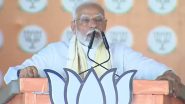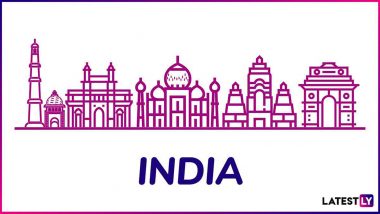New Delhi, Aug 10 (PTI) Justice Uday Umesh Lalit, who was on Wednesday appointed as the 49th Chief Justice of India (CJI) after President Droupadi Murmu signed his warrant of appointment, will become the second head of the Indian judiciary to be directly elevated to the Supreme Court bench from the Bar.
Justice S M Sikri, who became the 13th CJI in January 1971, was the first lawyer to be elevated directly to the top court bench in March 1964.
Also Read | Justice Uday Umesh Lalit Appointed As 49th Chief Justice of India.
Justice Lalit will assume charge on August 27, a day after the incumbent CJI Justice N V Ramana demits the office.
Justice Lalit will have a brief tenure of less than three months as the CJI and he would retire on November 8 this year. The retirement age of judges of the Supreme Court is 65.
Also Read | Telangana Shocker: Techie Dies Due to Cardiac Arrest While Playing Cricket in Hyderabad.
Justice Lalit, who was a senior advocate before being appointed a judge of the apex court on August 13, 2014, has been part of several path-breaking verdicts including the one which held the practice of divorce through instant 'triple talaq' among Muslims illegal and unconstitutional.
In January 2019, he recused himself from hearing the politically-sensitive Ram Janmabhoomi-Babri Masjid land title dispute in Ayodhya.
Justice Lalit, who was part of a five-judge Constitution bench headed by then CJI Ranjan Gogoi, had "expressed his disinclination to participate in the hearing any further" and opted himself out of the Ayodhya matter.
Senior advocate Rajeev Dhavan, appearing for a Muslim party in the matter, had told the Constitution bench that Justice Lalit had appeared as a lawyer for former Uttar Pradesh chief minister Kalyan Singh in a connected matter in the year 1997.
One of the path-breaking verdicts, of which Justice Lalit was part, was the August 2017 judgement by a five-judge Constitution bench which by a 3:2 majority ruled the practice of divorce through instant 'triple talaq' as "void", "illegal" and "unconstitutional".
While then Chief Justice J S Khehar and Justice S Abdul Nazeer were in favour of putting on hold the judgement for six months and asking the government to come out with a law to that effect, Justices Kurian Joseph, R F Nariman, and Lalit held the practice as violative of the Constitution. Justices Khehar, Joseph, and Nariman have since retired.
Recently, a bench headed by Justice Lalit had assembled at 9.30 am, an hour earlier than the usual working hour of the apex court, to hear matters.
"In my view, ideally we should sit at 9 in the morning. I have always said that if our children can go to school at 7 in the morning, then why can't we come at 9 am," Justice Lalit had observed.
Among the other important judgements, a bench headed by Justice Lalit had ruled the erstwhile royal family of Travancore has the management right over the historic Sree Padmanabhaswamy Temple in Kerala, one of the richest shrines, holding that the rule of "heritability must get attached to a right of Shebait" (servitor) of the temple.
The bench had allowed the appeal of the legal heirs of Uthradam Thirunal Marthanda Varma, the younger brother of the last ruler, Sree Chithira Thirunal Balarama Varma, setting aside the Kerala High Court's 2011 verdict which directed the state government to set up a trust to take control of the management and assets of the temple.
In another significant judgement, a bench headed by Justice Lalit had ruled that touching sexual parts of a child's body or any act involving physical contact with 'sexual intent' amounts to 'sexual assault' under section 7 of the Protection of Children from Sexual Offences (POCSO) Act as the most important ingredient is sexual intent and not skin-to-skin contact.
Quashing the controversial 'skin-to-skin' judgements of the Bombay High Court in two cases under the POCSO Act, the bench had said the high court erred in holding that there was no offence since there was no direct 'skin-to-skin' contact with sexual intent.
The high court had held that no offence of sexual assault under the POCSO Act was made out if there was no direct skin-to-skin contact between an accused and victim.
Justice Lalit, who is also the executive chairperson of the National Legal Services Authority (NALSA), recently said the NALSA is going to establish a "legal aid" system for the poor and the marginalised in all districts on the lines of the office of public prosecutors. He was addressing the first All India District Legal Services Authorities Meet here.
Born on November 9, 1957, Justice Lalit enrolled as an advocate in June 1983 and practised in the Bombay High Court till December 1985.
He shifted his practice to Delhi in January 1986, and in April 2004, he was designated as a senior advocate by the apex court.
He was appointed a special public prosecutor for the CBI to conduct the trial in the 2G spectrum allocation case.PTI ABA SJK ABA
(This is an unedited and auto-generated story from Syndicated News feed, LatestLY Staff may not have modified or edited the content body)














 Quickly
Quickly
















